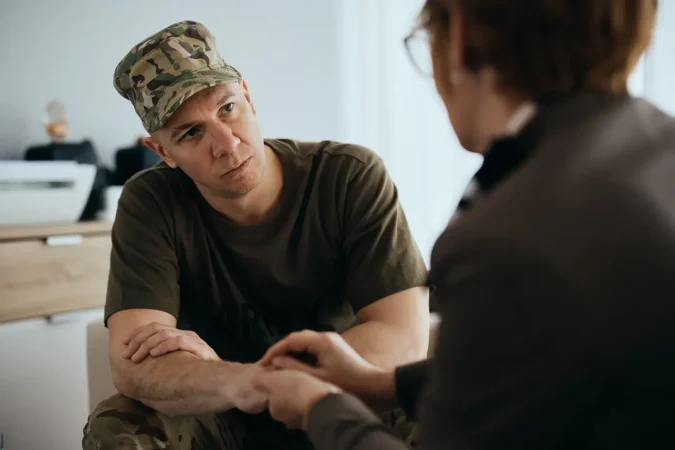Transitioning from military service to civilian life can be a major adjustment, and for many veterans, that shift comes with emotional strain. While military training instills resilience and discipline, it can also expose individuals to traumatic events, long separations from family members, and combat-related stress. Over time, these experiences can contribute to serious mental health conditions, including major depressive disorder.
Veteran mental health is a growing concern. According to the U.S. Department of Veterans Affairs, depression affects veterans at a higher rate than the general population, particularly those who served in high-intensity conflict zones like Afghanistan. Recognizing the signs early and knowing where to turn for support can make all the difference.
Recognizing the Symptoms of Depression in Veterans
Depression isn’t always obvious. For veterans, the symptoms may manifest differently than expected, often overlapping with other mental health disorders such as post-traumatic stress disorder or substance use disorder. Some veterans may withdraw, while others might express irritability or physical complaints.
Common symptoms of depression in veterans include:
- Persistent sadness or hopelessness
- Loss of interest in hobbies or previously enjoyable activities
- Fatigue or trouble sleeping
- Difficulty concentrating
- Changes in appetite
- Feelings of worthlessness or guilt
- Thoughts of death or self-harm
If these signs persist for more than two weeks or interfere with daily life, it may be time to seek professional help from a mental health care provider.
Why Veterans Face Increased Risk
Veterans are often at an increased risk for depression due to factors that may not impact civilians in the same way. Extended deployments, combat exposure, and traumatic brain injury can create a lasting emotional toll. Many also face unique challenges reintegrating into civilian roles, leading to relationship problems, job difficulties, and a loss of identity.
Additional risk factors for veteran depression include:
- Experiencing or witnessing traumatic events
- Co-occurring anxiety disorders or PTSD
- Chronic pain or disability
- Difficulty accessing mental health services
- Feelings of isolation or lack of community
- History of substance abuse
Understanding these risks helps family, friends, and loved ones approach the situation with greater empathy and awareness.
How Depression Affects Military Families
Depression doesn’t just impact the veteran—it also affects their family members and military families as a whole. It can disrupt family routines, create emotional distance, and put strain on relationships. Children may struggle to understand what’s happening, and spouses often feel helpless or overwhelmed.
Encouraging open communication and seeking family-inclusive mental health treatment can be a powerful way to strengthen the support system. Support groups for military families can also offer a sense of community and validation during difficult times.
Where to Begin: Getting a Diagnosis
The first step toward healing is identifying the issue. Depression is a diagnosable mental illness, and a proper evaluation by a mental health professional is essential for developing an appropriate treatment plan. This may involve a visit to a health care provider, a local VA, or a Vet Center.
Va.gov offers free screenings, referrals, and guidance for veterans experiencing mental health issues. A medical evaluation can help differentiate between depression, post-traumatic stress disorder, or other co-occurring mental health problems.
Treatment Options for Veteran Depression
There are several treatment options available for veterans with depression, depending on the severity and the veteran’s personal preferences. These may include a combination of therapies and health care services.
Common treatments include:
- Psychotherapy: Talk therapy with a licensed provider, such as cognitive behavioral therapy (CBT), helps veterans identify negative thought patterns and develop healthier responses.
- CBT: A structured, evidence-based form of therapy that is particularly effective for depression, anxiety disorders, and trauma.
- Medication: Antidepressants or mood stabilizers may be prescribed to help manage symptoms.
- Support groups: Peer-led or clinician-led groups that provide connection and understanding among fellow service members or veterans.
- In-person counseling at VA clinics, Vet Centers, or private providers who specialize in veteran mental health.
In more severe cases, inpatient treatment at a medical center or specialized mental health facility may be recommended to ensure safety and monitor for suicide prevention needs.
Understanding the Role of the VA
The U.S. Department of Veterans Affairs plays a central role in delivering mental health care to veterans across the country. Through VA healthcare, veterans have access to therapy, medication management, case coordination, and crisis services. If you or a veteran you know is unsure how to begin, reaching out to the local VA is often the best place to start.
Services include:
- Free mental health screenings
- Access to mental health professionals
- Specialized care for co-occurring substance use disorders
- Long-term wellness support and aftercare
Those enrolled in VA healthcare can also request a referral to community providers if a service is not available locally.
What to Do in a Crisis
If a veteran is expressing suicidal thoughts, has made a plan to harm themselves, or is in immediate danger, it’s critical to act quickly. Depression can escalate into a crisis, and timely intervention can save a life.
Immediate steps to take:
- Call the Veterans Crisis Line by dialing 988 and pressing 1
- Encourage the veteran to talk openly about how they’re feeling
- Do not leave the person alone if they’re at risk
- Remove weapons, medications, or other means of self-harm
- Get to a medical center or emergency department if needed
The hotline is staffed 24/7 with trained responders who understand military service and the unique experiences veterans face. It’s a vital lifeline during moments of crisis.
How Family and Loved Ones Can Help
Family members and loved ones play a vital role in supporting a veteran’s recovery. While you can’t force someone to seek help, you can offer compassion, encouragement, and information about mental health treatment options. Often, your support is what motivates someone to take the first step.
Ways to support a veteran with depression:
- Educate yourself about mental illness and veteran mental health
- Offer to help make appointments or attend them together
- Listen without judgment and validate their feelings
- Encourage participation in support groups or community resources
- Watch for warning signs of crisis or substance abuse
Sometimes, family support may include attending therapy together or receiving a referral for individual counseling to process your own emotions.
Long-Term Wellness and Aftercare
Healing from depression doesn’t happen overnight. For many veterans, recovery is a journey that involves ongoing therapy, lifestyle changes, and community support. Finding purpose, rebuilding relationships, and staying connected to others are all part of maintaining well-being over time.
After completing formal treatment, veterans may benefit from:
- Continuing CBT or psychotherapy
- Regular check-ins with a health care provider
- Reconnecting with veteran communities or alumni groups
- Developing a daily routine that includes physical activity and self-care
- Engaging in meaningful work, hobbies, or volunteer service
The goal is not only symptom management but a fulfilling, connected life post-service.
Getting Help at Safe and Sound Treatment
At Safe and Sound Treatment, we understand the unique struggles veterans face when it comes to depression and other mental health challenges. Our programs are designed to meet the needs of veterans seeking compassionate, structured care that works. Whether you’re managing depression, trauma, or co-occurring substance use disorder, we’re here to help you find your path forward.
Our team of licensed therapists and medical professionals creates individualized treatment plans that include evidence-based therapies like CBT, medication management, and support for military families. We work closely with community partners, VA healthcare providers, and referral networks to ensure you or your loved one gets the care you deserve.
If you’re ready to begin or have questions about getting started, reach out today. Healing is possible, and you don’t have to face it alone.













